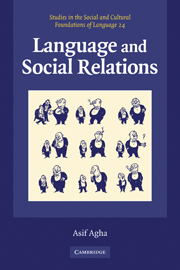Book contents
- Frontmatter
- Contents
- List of figures
- List of tables
- Acknowledgments
- Typographical conventions
- Introduction
- 1 Reflexivity
- 2 From referring to registers
- 3 Register formations
- 4 The social life of cultural value
- 5 Regrouping identity
- 6 Registers of person deixis
- 7 Honorific registers
- 8 Norm and trope in kinship behavior
- Notes
- References
- Index
- STUDIES IN THE SOCIAL AND CULTURAL FOUNDATIONS OF LANGUAGE
3 - Register formations
Published online by Cambridge University Press: 05 September 2012
- Frontmatter
- Contents
- List of figures
- List of tables
- Acknowledgments
- Typographical conventions
- Introduction
- 1 Reflexivity
- 2 From referring to registers
- 3 Register formations
- 4 The social life of cultural value
- 5 Regrouping identity
- 6 Registers of person deixis
- 7 Honorific registers
- 8 Norm and trope in kinship behavior
- Notes
- References
- Index
- STUDIES IN THE SOCIAL AND CULTURAL FOUNDATIONS OF LANGUAGE
Summary
Introduction
The purpose of this chapter is to develop a fuller account of register phenomena and the methods by which they are studied. Some features of register formations were summarized earlier in 1.7 and 2.6. We noted that registers are cultural models of action that link diverse behavioral signs to enactable effects, including images of persona, interpersonal relationship, and type of conduct. The first part of this chapter focuses on registers of discourse. Once we understand the processes through which models of sociability come to be associated with speech the fact that register models readily extend to other types of signs is easily understood. Let us begin, however, with the most obvious way in which facts of register variation are encountered in social life.
Language users often employ labels like ‘polite language,’ ‘informal speech,’ ‘upper-class speech,’ ‘women's speech,’ ‘literary usage,’ ‘scientific term,’ ‘religious language,’ ‘slang,’ and others, to describe differences among speech forms. Metalinguistic labels of this kind link speech repertoires to enactable pragmatic effects, including images of the person speaking (woman, upper-class person), the relationship of speaker to interlocutor (formality, politeness), the conduct of social practices (religious, literary, or scientific activity). They hint at the existence of cultural models of speech – a metapragmatic classification of discourse types – linking speech repertoires to typifications of actor, relationship and conduct. This is the space of register variation conceived in intuitive terms.
- Type
- Chapter
- Information
- Language and Social Relations , pp. 145 - 189Publisher: Cambridge University PressPrint publication year: 2006



